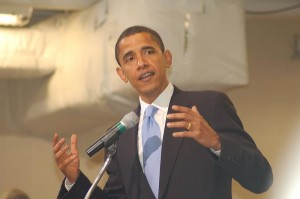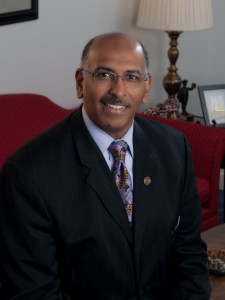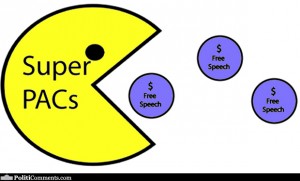Possibly the stupidest/most illogical political column of the cycle to date: Joe Manchin supports Obama: [Charleston Daily Mail]
 The Politics of Media More than 40 million tuned in to NBC’s coverage of the Olympics Opening Ceremony on Friday, making it the most watched ever for the network. [LA Times] CNN’s President, Jim Walton, announced he will step down at the end of the year. He said the network needs “new thinking.” [The Wall Street Journal] Viacom will publicly oppose the Defense of Marriage Act. The company is joining a group of entities that is filing a court brief expressing opposition. [TVBlog] The New York Times Company saw circulation revenue surpass advertising revenue over the first half of 2012. [New York Magazine] NBC’s Today and ABC’s Good Morning America are now too close to call in ratings races. Today had been the perpetual leader for years. [NYT]
It’s not that the summer never matters: John Kerry’s offhanded remark that he had supported the Iraq invasion before he was against it was a precious kind of self-inflicted injury that happened during the summer lull. But for the most part, the fluctuations in campaign performance and the free media squalls of the convention run-up are over-borne by larger electoral forces. The fatigue with the Bush years and John McCain’s inability to separate himself from that record trumped Obama’s lull; the fundamentally even dynamic of the 2000 contest, a race between two broadly popular, non-polarizing figures in a largely contented electorate, was too fixed to be shaken by momentary plot twists. And the list could go on: for every defining moment in June or July, like Kerry’s gaffe, the list of half-time perceptions that proved flat wrong is far larger and more telling. The fact is that this race is frozen, and polling as recent as today suggests that Romney’s tax returns and the new surface wounds around his private equity days (must the producers of the Batman installment opening this week have chosen as its evildoer a menace named “Bane”, rhymes with “Bain”?) have not changed the race much, if at all. (William Galston, the most perceptive Obamian at the New Republic, agrees). But Republicans would still be wise to understand the exchange of blows in July as revealing of a pathway that could pry open the deadlock if Camp Romney is not careful.
Second, the Clinton campaign matched Obama’s ruthlessness with its own hesitance about returning fire with the same kind of aggression. It is entirely understandable that the Clintonites pulled their punches on Jeremiah Wright in a party where racial ethnic politics is so primal, far less defensible that they shrunk from leveling sustained fire at Obama’s gamey pattern of avoiding controversial votes in the Illinois legislature, or his links to a notorious influence peddler in Chicago, or even more inexplicable, that it never exposed blue collars and rural Democrats in Indiana and North Carolina to Obama’s far-left leaning record in the trenches of Illinois politics (including a lone wolf vote to reduce imprisonment for sex offenders). Clinton’s strategists were neither inexperienced nor immobilized: their error was in their conviction that Obama’s manifest greeness and the haziness of his public profile were destined to defeat him. It’s hard not to hear some echoes of that mis-placed confidence in Republican circles now, when the case is made that Obama’s economic record is so weak that voters are bound to reject it. It’s equally hard to miss that Republican frustration this cycle at Obama’s resilience sounds, verse for verse, like the post-mortems in Clintonland around a candidate who seemed so overmatched the first nine months of the race. Read the rest of…
But it is the donations to the “super PACs” that have whipped Democrats into a frenzy and spurred the news media to turn their spotlight on the growing role and influence of these PACs and the individuals who fund their activities. Such big donations lead some politicians and pundits to paint super PAC donors as nefarious agents corrupting the political process. The political left has especially been critical of the role that these organizations and their donors play since the U.S. Supreme Court handed down its decision in Citizens United v. Federal Election Commission in 2010. Specifically, the high court ruled that “the Government may not suppress political speech based on the speaker’s corporate identity.” In other words, PACs that did not make contributions to candidates, parties or other PACs could accept unlimited contributions from individuals, unions and corporations (both for-profit and not-for-profit) for the purpose of making independent expenditures for “express advocacy or electioneering communications purposes.” Citizens United essentially ensured that corporations would have the right to free speech, just as the unions were enjoying. The Supreme Court gave little credence to the government’s argument that the First Amendment does not cover corporations because they are not “persons.” Corporations are, after all, the court would note, just “associations of people,” and the First Amendment should protect their right to petition the government. That being said, most donations to super PACs have come not from corporations but from the wealthy individuals who run them. According to the Center for Responsive Politics, the top 100 individual super PAC donors in 2011-12 made up just 3.7 percent of contributors but accounted for more than 80 percent of the total money raised.
Of course, super PACs are being criticized specifically for engaging in heavily negative campaign advertising. Yet, like them or not, such attack ads often work to drive up the negatives of opponents. Ironically, despite calls for less negative campaigning by the presidential candidates as well as their respective super PACs, research early in the 2012 campaign indicated that most voters found negative advertising informative and that candidates benefited from negative advertising sponsored by PACs. The Citizens United case and its aftermath, however, have nothing to do with the fact that the campaign-finance-reform law passed by Congress and from which the Citizens United case was born woefully neglected to include an effective donor-reporting mechanism that could have been an adequate check on the mega-donations made to such PACs. Simply put: Congress should have written full disclosure into the law. By January 2010, though, at least 38 states and the federal government had come around to requiring disclosure for all or some independent expenditures or election communications — stipulations intended to deter potentially corrupting donations. Yet, despite these laws, many voters go to the polls not knowing who funded those political commercials running incessantly for the past three weeks. In fact, in federal elections, PACs have the option of filing reports on a monthly or quarterly basis, which often means that funds are collected and spent long before the legal filing disclosure is required. Read the rest of… News Corp. patriarch Rupert Murdoch resigned from several boards controlling newspapers his company owns, including The Sun, The Times, and The Sunday Times. Growing speculation surrounds the future of his newspaper group. [Telegraph] Partnership with NBCUniversal makes Twitter the official online “narrator” of the Olympics. [WSJ] ABC’s Brian Ross caused a stir after he incorrectly linked James Holmes, the Aurora, Colo. shooting suspect, with the Colorado Tea Party Patriots. [Politico] Larry King is back… but on the Web. The famous former CNN interviewer is hosting ‘Larry King Now’ on Hulu. [LA Times] PBS President Paula Kerger is disappointed lawmakers are seeking to cut funding for the broadcasting giant. [AP] NBC’s Bob Costas still tells it like it is. The sportscaster is preparing for Olympic coverage that will feature him prominently. [The Hollywood Reporter] Here’s the backstory behind the sterilization of politics, the pseudo-neutering of political journalism. [New York Times] A few months ago, I reviewed Peter Beinart’s trashy, error-filled hit-job on the State of Israel, The Crisis of Zionism. As more and more Zionists have piled on, it seems as if Beinart is seeking the aid and comfort of some of Israel’s — and Judaism’s — worst enemies. This week, the Atlantic exposed Beinart’s new relationship with the uber-controversial, anti-Zionist Web site, Mondoweiss:
Click here to read the full article.
Nice piece by Alex Burns of Politico on the emergence of Maryland Governor Martin O’Malley as President Obama’s “sharpest-tongued, most enthusiastic…advocate” [Politico] ESPN’s legendary columnist wrote an important column on Joe Paterno, the man he profiled for the Sports Illustrated‘s Sportsman of the Year issue in 1986. SPOILER ALERT: It’s devastating. [ESPN] This weekend, the RP appeared on WKYT’s Kentucky Newsmakers, the oldest and most respected TV news interview program in the Commonwealth, hosted by The RP’s friend, local broadcasting legend Bill Bryant. Enjoy their discussion (in two segments below) about poker, politics and a whole lot more: PART ONE: PART TWO:
|
| ||
| Copyright © 2026 The Recovering Politician - All Rights Reserved | |||












